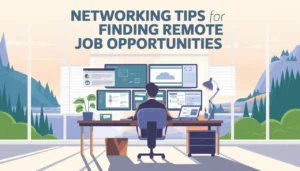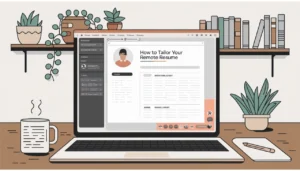Freelancing is one of the most rewarding career paths. It offers flexibility, independence, and, if you know How to Find Your First Freelance Job and markets, can bring in serious earnings. However, finding that first freelance job is challenging-mostly if a person is not experienced with freelance work. This comprehensive guide will give you valuable tips and strategies on how to find the first freelance gig and start a reputation-filled career.

One thing you must do before you start your journey is identify your skills and niche: What are you good at? What are you passionate about? This narrows your focus to work with a likely right kind of client.
Self-assessment: Take some time to go through the things that can tell you that you are simply better than others in your strengths, interests, and experiences.
What comes to you? What activities have you enjoyed in the past?
Skills inventory: List your technical and soft skills. These might include writing graphic design, programming, marketing, customer service, or any other skill that interests you.
Is it a particular industry, niche, or even a specific type of project? For example, you could be a writer and specialize in content marketing in the tech industry.
2. Solid Online Presence
These days, freelance clients expect to see a solid online presence from potential freelancers. Here are the steps to build your online brand:
Build your professional website Your website is your digital storefront. It will embody who you are, what you know, and what you can do. You want to make sure it represents your skills, your experience, and even your portfolio. Use a modern website builder like WordPress or Squarespace to build a nice, striking, and informative site.
Make the most of social media: Establish your presence on relevant platforms such as LinkedIn, Twitter, and Instagram. Share your work, interact with other professionals, and connect with potential clients.
Optimize your online profiles: Complete and accurate profiles for LinkedIn, Google My Business, and all applicable profiles; include keywords for searches that might find you.
3. Build a Portfolio
Your portfolio is actually the best marketing tool. It can tell and demonstrate your whole potential to real clients. Here’s how to make a good portfolio
Collect good work: Collect samples of your good work, whether it’s from previous jobs, personal projects, or freelance gigs.
Highlight your skills: Choose projects that showcase your specific skills and expertise.
Showcase your work well: Share a space on Behance, Dribbble, or your own website to showcase your portfolio in relation to the type of skills you have and the quality and different sorts of work you are capable of.
4. Networking
Networking is always a significant part of freelance work. Here are some ways of relating to your clients:
Go to industry events: You should attend a conference, a meetup, and a workshop related to your line of work.
Join online communities: You can associate with other freelancers and potential clients as on linked in, facebook groups, forums, etc.
Reach out to your network: Tell all your friends, family, and friends of friends that you are now a freelancer. They might just have a contact who’s looking for people like you.
5. Create a Professional Proposal
Now, whenever you discover a prospect, it is a requirement to give him a professional proposal. That means you ought to put out in the proposal your qualifications, experience, approach to the project and how you expect to get paid. Here are key elements that you should include:

Project overview: This is basically on outlining the scope of the project as well as a reasoned understanding of what the client desires.
Your qualifications: You should outline the particular skills, experience, and expertise that qualify you for the proposal.
Project approach: Describe your approach and process to delivery of the project for your client to understand.
Timeline and deliverables: Create a timeline of project deliverables, i.e., what you will be producing.
Pricing: Clearly highlight your rate and your payment terms.
6. Bargain your rate
Pricing and Charging Freelance Rates
A substantial part of freelancing is negotiating rates. Here are some guidelines on how to set fair and competitive rates:
Do your homework: be aware of what other freelancers in your field are charging.
- Your experience and expertise: The more you are into something, the more expertise you develop, and hence, the higher the charges.
- Your overhead costs: Consider your expenses, including equipment, software, and office space.
- Prepare to negotiate: You should not be afraid to negotiate but then be reasonable and flexible
- Develop Client Relationships
Once you get your first freelance job, keeping great relationships with your clients will definitely be one good way to have repeat business and referrals. The following are some possible ways to keep a good relationship with your client.
Open a regular line of communication: Let the customers know the developments.
Be responsive: Be quick in responding to emails or messages which may come to you from them.
Ensure timely delivery and high quality: Deliver your commitment within time and above the expectations of the clients.
Solicitation of feedback: Ask your clients for corrections to enhance your work and service.
Conclusion
Finding that first freelance job takes hard work, persistent effort, and a focused strategy. By following some of the tips on this page, you can best position yourself for success in building a successful freelance career. To do that, make sure you identify your niche, build your strong online presence, create a compelling portfolio, network effectively, and bargain your rate. With hard work and perseverance, you can actually attain your freelancing goals.
Asked Questions About Freelancing
How do I get my first freelance job?
Start with the determination of your skills and niche. Build a strong online presence: create a personal website and other social media profiles. Create a portfolio that demonstrates some of your best work. Network: connect with other freelancers and potential clients
What skills are in demand for freelancing?
In-demand freelance skills include writing, graphic design, programming, marketing, customer service, and many technical skills.
How do I set freelance pricing?
Do your homework on industry standards; consider your experience and expertise; factor in overhead costs; and you can bet negotiation will be necessary.
Building Your Business
How do I write a professional freelance proposal?
A proposal should include the following:
Project Overview
Qualifications
Project Approach
Timeline and Deliverables
Pricing
How do I manage my time as a freelancer?
Apply time management techniques like the Pomodoro Technique, establishment of clear deadlines, and avoidance of distractions.
What Tax Obligations Would I Have with Freelancing?
Consult a tax professional to learn about your tax obligations along with your deductible expenses
Acquiring Clients and Networking
How do I find freelance job boards?
Check out popular job boards for freelancers through Upwork, Freelancer, Fiverr, and Guru.
How can I access clients?
Network at industry events and join online communities to reach out to your network
How do I cold pitch clients?
Do research about clients and pitch to their specific needs, and be consistent but courteous
Legal and Contractual Matters
Do I need a license as a freelancer?
Yes. This depends on where you are. The local authority of your work place would guide you.
What are the terms to include in a freelance contract?
Scope of work: Deliberate clearly on deliverables, timeline, payment terms, ownership and control of intellectual property rights, and dispute resolution procedures.
How do I protect my intellectual property?
Copyrights and Trademark Laws. Read up on the copyright and trademark laws that may apply to your work, and consider applying for copyrights or trademark registrations of them.
Personal and Professional Development
What do I do to remain motivated and focused while freelancing?
Set goals, celebrate your success, and get a network of support friends who are freelancers as well.
Benefits of Constant Learning for Freelancers?
This will keep you updated on the different industry trends and acquire new skills, hence staying competitive and attracting more clients.
How do I maintain work-life balance while freelancing?
Plan boundaries, prioritize tasks, and take breaks.







